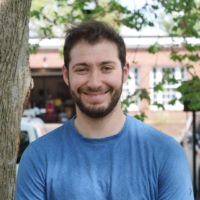Outstanding Undergraduate Research Awards Winners Announcement
By Julia Sepulveda, Program Associate, CRA-E
2023-2024 Outstanding Undergraduate Researcher Award Recipients
The Computing Research Association (CRA) would like to congratulate the recipients of the 2023-2024 Outstanding Undergraduate Researcher Award!
With the support of Microsoft Research and Mitsubishi Electric Research Labs (MERL), CRA celebrates and recognizes undergraduates who demonstrate outstanding potential in an area of computing research. This year’s awards are sponsored by Mitsubishi Electric Research Labs (MERL).
Faculty from institutions across North America nominated undergraduate researchers who demonstrate strong research capabilities and a commitment to advancing the field. This year, Alejandro Medina (Southwestern University), Arvin Sahami (University of British Columbia), George Zhaoqi Li (University of Maryland), and Kianna Bolante (University of Washington) were selected as awardees. As such, these students will receive up to $1,500 of financial support to attend a research conference of their choice.
CRA continues to be amazed and inspired by the talent that persists across the continent. This year’s group demonstrated stellar accomplishments; several nominees contributed to more than one research project and many of them authored multiple publications. Importantly, the research contributions of this year’s nominees had a broad and deep impact on the computing community. Several nominees led the development, analysis, and progression of long-standing research problems in their respective areas. And, collectively, their research demonstrated a commitment to theoretical advancements and real-world applications.
Given the impressive nature of the nominees, CRA would also like to commend every student who was selected as an awardee, runner-up, finalist, and honorable mention. We look forward to seeing what this next generation of talent will do going forward.
A special thank you to Co-Chairs of the selection committee Michael Hilton (Carnegie Mellon University) and Steven Swanson (University of California, San Diego), who led this year’s efforts. CRA is also grateful towards Alex Psomas (Purdue University), Anna Rafferty (Carleton College), Bo Zhu (Dartmouth College), Brittany Duncan (Nebraska-Lincoln University), Hadi Hosseini (Pennsylvania State University), Jonathan Bell (Northeastern University), Matt Weinberg (Princeton University), Ovidiu Daescu (University of Texas, Dallas), Rahmat Beheshti (University of Delaware), and Tracy Hammond (Texas A&M University) for volunteering their time to review and acknowledge this year’s nominees.
A full list of the winners, runners-up, finalists, and honorable mentions is available below
Awardees:
Alejandro Medina, Southwestern University
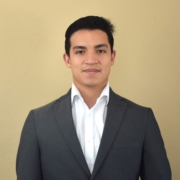 Alejandro Medina is a senior at Southwestern University, majoring in computer science, with minors in mathematics and data science. His research spans various areas, including cooperative work, Dial-a-Ride scheduling, and studying generative algorithms via evolving flying machines in Minecraft. His work in evolutionary computation focused on improving generative AI to be better at content creation for video games. Alejandro developed a fitness function that successfully generated diverse and high-quality flying machines. Alejandro also led a project to implement and perform evaluation of a dial-a-ride scheduling problem, providing empirical insights to complement previous theoretical findings. In addition to research, Alejandro is active in departmental organizations, including the CS club and the Math club; he also serves the department as the Vice President of the Honor Code Council, and as an officer in HALO, the Hispanics and Latinx Organization.
Alejandro Medina is a senior at Southwestern University, majoring in computer science, with minors in mathematics and data science. His research spans various areas, including cooperative work, Dial-a-Ride scheduling, and studying generative algorithms via evolving flying machines in Minecraft. His work in evolutionary computation focused on improving generative AI to be better at content creation for video games. Alejandro developed a fitness function that successfully generated diverse and high-quality flying machines. Alejandro also led a project to implement and perform evaluation of a dial-a-ride scheduling problem, providing empirical insights to complement previous theoretical findings. In addition to research, Alejandro is active in departmental organizations, including the CS club and the Math club; he also serves the department as the Vice President of the Honor Code Council, and as an officer in HALO, the Hispanics and Latinx Organization.
Arvin Sahami, University of British Columbia
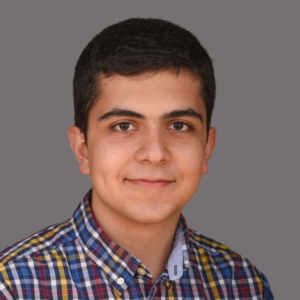 Arvin Sahami is a junior at the University of British Columbia, majoring in computer science and mathematics. His research is focused on theoretical computer science. Arvin collaborated on research that addressed a statistical experiment design problem defined by Rao in 1947 that was unsolved for 76 years. His contributions led to the development of a new algorithm capable of constructing orthogonal arrays whose size asymptotically match their lower bound. While Arvin’s contributions produced an important theoretical result, it is also important to note that it is practical and may have a broader impact for statistical experiment design. Beyond his contributions to research, Arvin volunteers in a math camp for high school students and participates in math and programming competitions.
Arvin Sahami is a junior at the University of British Columbia, majoring in computer science and mathematics. His research is focused on theoretical computer science. Arvin collaborated on research that addressed a statistical experiment design problem defined by Rao in 1947 that was unsolved for 76 years. His contributions led to the development of a new algorithm capable of constructing orthogonal arrays whose size asymptotically match their lower bound. While Arvin’s contributions produced an important theoretical result, it is also important to note that it is practical and may have a broader impact for statistical experiment design. Beyond his contributions to research, Arvin volunteers in a math camp for high school students and participates in math and programming competitions.
George Zhaoqi Li, University of Maryland
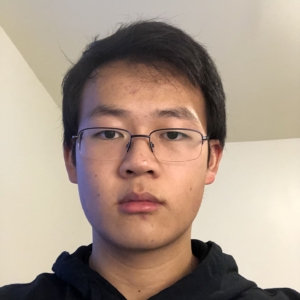 George Zhaoqi Li is a senior at the University of Maryland, College Park, majoring in computer science and mathematics. His research spans several areas of theoretical computer science with a particular focus on problems relevant to the COVID-19 pandemic. George’s primary research involved optimizing vaccine distribution while accounting for patient mobility and privacy. His work was both innovative and impactful. George actively contributes to academia, frequently presenting on differential privacy and developing homework problems on the topic for courses at his university. Beyond his role as a researcher, George is a table tennis player; he and his teammates recently placed 10th at the College Table Tennis National Championships.
George Zhaoqi Li is a senior at the University of Maryland, College Park, majoring in computer science and mathematics. His research spans several areas of theoretical computer science with a particular focus on problems relevant to the COVID-19 pandemic. George’s primary research involved optimizing vaccine distribution while accounting for patient mobility and privacy. His work was both innovative and impactful. George actively contributes to academia, frequently presenting on differential privacy and developing homework problems on the topic for courses at his university. Beyond his role as a researcher, George is a table tennis player; he and his teammates recently placed 10th at the College Table Tennis National Championships.
Kianna Bolante, University of Washington
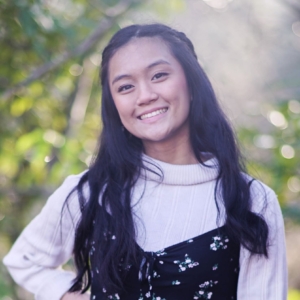 Kianna Bolante is a junior at the University of Washington, majoring in computer science. Her research touches on social computing, accessibility, and computer science education. Kianna developed and refined six educational modules for high school students on social aspects of computing (e.g., online behavior, machine learning and bias, and misinformation), and presented them to over fourteen hundred students at thirteen schools around Seattle. She measured the impact of her presentations and learned that the vast majority of the students found socially-focused topics more interesting than STEM topics in general. Kianna also contributed meaningfully to a project that helped people with Parkinson’s disease through virtual reality and supported an international study of identity- vs. person-first language preferences among disabled people. In addition to being a researcher, Kianna is an advocate for inclusivity and empowerment. She serves as chair of the Computing Community group in her department and served as an outreach committee lead of the Society of Women Engineers.
Kianna Bolante is a junior at the University of Washington, majoring in computer science. Her research touches on social computing, accessibility, and computer science education. Kianna developed and refined six educational modules for high school students on social aspects of computing (e.g., online behavior, machine learning and bias, and misinformation), and presented them to over fourteen hundred students at thirteen schools around Seattle. She measured the impact of her presentations and learned that the vast majority of the students found socially-focused topics more interesting than STEM topics in general. Kianna also contributed meaningfully to a project that helped people with Parkinson’s disease through virtual reality and supported an international study of identity- vs. person-first language preferences among disabled people. In addition to being a researcher, Kianna is an advocate for inclusivity and empowerment. She serves as chair of the Computing Community group in her department and served as an outreach committee lead of the Society of Women Engineers.
Runners Up:
Alexa Schor, Yale University
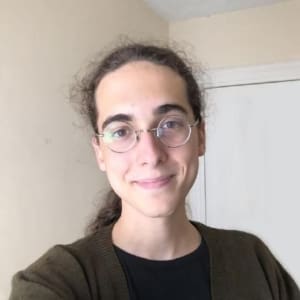 Alexa Schor is a senior at Yale, majoring in computer science. Her research is in computer graphics, where she focuses on addressing long-standing challenges in fractal geometry generation. Her work addresses the production of fractals and their potential animation, problems that are of great interest to movie studios and artists. Alexa’s work built on and quickly surpassed her advisor’s prior efforts. She devised a stable, rapid, and highly adjustable solution with stunning visual outcomes. Alexa’s algorithm was able to unlock, what her advisor called “an entirely different class of geometry.” Beyond research, Alexa is an avid baker and metalworker. She also enjoys studying linguistics, and currently serves as the Co-President of Trans@Yale.
Alexa Schor is a senior at Yale, majoring in computer science. Her research is in computer graphics, where she focuses on addressing long-standing challenges in fractal geometry generation. Her work addresses the production of fractals and their potential animation, problems that are of great interest to movie studios and artists. Alexa’s work built on and quickly surpassed her advisor’s prior efforts. She devised a stable, rapid, and highly adjustable solution with stunning visual outcomes. Alexa’s algorithm was able to unlock, what her advisor called “an entirely different class of geometry.” Beyond research, Alexa is an avid baker and metalworker. She also enjoys studying linguistics, and currently serves as the Co-President of Trans@Yale.
Andi Xu, University of Michigan
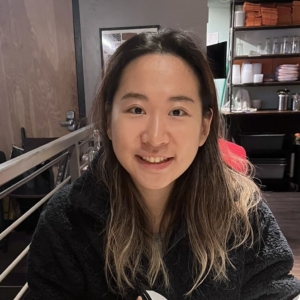 Andi Xu is a senior at the University of Michigan, majoring in computer science and mathematics. Her research interests are in allowing blind and visually impaired (BVI) people to create their own AI-powered assistive applications. Andi designed user studies to understand the varied ways that BVI people customize technology, and used the findings to develop a design probe that allows users to understand elements of their physical environment. Andi also led the deployment studies for two mobile applications that BVI people use to extract information from their environment. Her analyses have broadened understanding of how visual assistive applications are leveraged by users. In addition to her research, Andi serves as a teaching assistant for an upper-division User Interface course and is a member of UMichigan’s Girls in Electrical Engineering and Computer Science club where she works to improve diversity in CS.
Andi Xu is a senior at the University of Michigan, majoring in computer science and mathematics. Her research interests are in allowing blind and visually impaired (BVI) people to create their own AI-powered assistive applications. Andi designed user studies to understand the varied ways that BVI people customize technology, and used the findings to develop a design probe that allows users to understand elements of their physical environment. Andi also led the deployment studies for two mobile applications that BVI people use to extract information from their environment. Her analyses have broadened understanding of how visual assistive applications are leveraged by users. In addition to her research, Andi serves as a teaching assistant for an upper-division User Interface course and is a member of UMichigan’s Girls in Electrical Engineering and Computer Science club where she works to improve diversity in CS.
Benjamin Przybocki, Stanford University
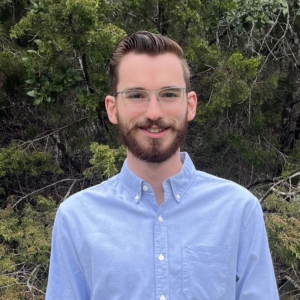 Benjamin Przybocki is a senior at Stanford University, majoring in mathematics with a minor in computer science theory. His research is focused on automated reasoning. Ben’s research proved results in the area of theory of finite sequences, as well as proofs to show the non-existence of combinations of first-order theories that previous work had been unable to either find examples, or prove to be impossible. In addition to his work at Stanford, Ben has participated in several REUs, where he focused on combinatorics. His research contributions determined exactly the possible lengths of words with several properties. Ben mentors college, high school, and middle school students in math and computer science. He also mentors a prison inmate through the Prison Mathematics Project.
Benjamin Przybocki is a senior at Stanford University, majoring in mathematics with a minor in computer science theory. His research is focused on automated reasoning. Ben’s research proved results in the area of theory of finite sequences, as well as proofs to show the non-existence of combinations of first-order theories that previous work had been unable to either find examples, or prove to be impossible. In addition to his work at Stanford, Ben has participated in several REUs, where he focused on combinatorics. His research contributions determined exactly the possible lengths of words with several properties. Ben mentors college, high school, and middle school students in math and computer science. He also mentors a prison inmate through the Prison Mathematics Project.
Isaac Hair, University of California, Santa Barbara
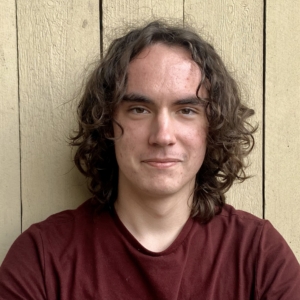 Isaac Hair is a sophomore, majoring in computing. His research area is in computer architecture. Isaac’s work tackles energy consumption bottlenecks inherent to machine learning training and other applications, which move petabytes of data across data center’s networks. His solution, includes building a “Data center hyperloop” that physically moves SSDs containing data at high speeds through a vacuum tube assisted by magnetic levitation and acceleration. In addition to the work optimizing data transfers, Issac has participated in research at UIUC, on the problem of 3SUM. Issac is a member of the UCSB Formula SAE club, and serves as a math tutor for students at his former high school.
Isaac Hair is a sophomore, majoring in computing. His research area is in computer architecture. Isaac’s work tackles energy consumption bottlenecks inherent to machine learning training and other applications, which move petabytes of data across data center’s networks. His solution, includes building a “Data center hyperloop” that physically moves SSDs containing data at high speeds through a vacuum tube assisted by magnetic levitation and acceleration. In addition to the work optimizing data transfers, Issac has participated in research at UIUC, on the problem of 3SUM. Issac is a member of the UCSB Formula SAE club, and serves as a math tutor for students at his former high school.
Finalists:
- Ajay Sridhar, University of California, Berkeley
- Andre Ye, University of Washington
- Ann Li, University of Virginia
- Anna Baskin, University of Pittsburgh
- Claris Winston, University of Washington
- Eli Pregerson, Harvey Mudd College
- Eric Chen, Cornell University
- Federico Cassano, Northeastern University
- Jacob Chen, Williams College
- Mark Bedaywi, University of Toronto
- Matthew Yang, University of Waterloo
- Maximilian Du, Stanford University
- Megan Frisella, Brown University
- Om Chabra, University of Illinois, Urbana-Champaign
- Peter Eckmann, University of California, San Diego
- William Yik, Harvey Mudd College
Honorable Mentions:
- Aditya Ranjan, University of Maryland
- Alan Baade, University of Texas at Austin
- Alex Suh, University of Virginia
- Alex Zhuang, University of Waterloo
- Alexander Martin, University of Rochester
- Alice Qian Zhang, University of Minnesota
- Alsa Khan, Cornell University
- Amanda Kane, Belmont University
- Angela Cui, Cornell University
- Anh Truong, Brown University
- Ashley Zhuang, Harvard College
- Athreyi Badithela, University of Minnesota
- Audrey (Yutong) Bu, Emory University
- Benjamin Burns, Ohio State University
- Benny Rubin, Cornell University
- Brandon Vu, Stanford University
- Brendan Burkhart, Johns Hopkins University
- Brennan Freeze, Sonoma State University
- Caroline He, Cornell University
- Carolyn Zech, Brown University
- Catherine Huang, Harvard College
- Charumathi Badrinath, Harvard College
- Chenhao Zheng, University of Michigan
- Cyrus (Zikai) Zhou, University of Chicago
- Daniel Ji, University of California, San Diego
- David Rudo, Carnegie Mellon University
- Dennis Tang, Duke University
- Edward He, Tufts University
- Eleanor Lin, Columbia College
- Emilie Rivkin, Swarthmore College
- Ethan Dong, Yale University
- Feiyu Gavin Zhu, Carnegie Mellon University
- Frank Willard, Duke University
- Gaotang Li, University of Michigan
- Garrett Weil, Northwestern University
- Greta Berendes, Cornell University
- Guilin Hu, Cornell University
- Haoran Zhao, Drexel University
- Haoyun Qin, University of Pennsylvania
- Harry Chen, Duke University
- Huong Pham, Cornell University
- Hyunsuk Bang, Illinois Institute of Technology
- Imani Finkley, Cornell University
- Jacob Serfaty, University of Chicago
- Jasmine DeGuzman, University of Minnesota
- Jasper Gerigk, University of Toronto
- Jessie (Zixin) Chen, Yale University
- Jia Pan, Johns Hopkins University
- Jiawen Zhu, University of Waterloo
- Jimena Guallar-Blasco, Johns Hopkins University
- Jimmy Xin, University of Texas at Austin
- Jiuding Sun, Northeastern University
- Joel Goh, Northwestern University
- John Link, University of Virginia
- Katherine Quintanilla, Tufts University
- Kathleen Shea, Colorado College
- Kiara Johnson, Carleton College
- Kittson Hamill, University of Alabama
- Konghao (Shelton) Zhao, Wake Forest University
- Liam Strand, Tufts University
- Liang (Leon) Lu, Carnegie Mellon University
- Liza Jivnani, University of South Florida
- Mallory Anderson, West Virginia University
- Mark Barbone, University of California, San Diego
- Marko Veljanovski, Northwestern University
- Maryam Abuissa, Amherst College
- Matthew Freestone, Auburn University
- Matthew Ho, University of California, Santa Barbara
- Matthew Williams, Auburn University
- Michael Tang, Princeton University
- Michelle Qiu, Duke University
- Nadharm Dhiantravan, Northwestern University
- Nigel Newby, University of Pennsylvania
- Nuria Chandra, University of Washington
- Oscar Yin, Johns Hopkins University
- Param Damle, University of Virginia
- Parth Asawa, University of California, Berkeley
- Peter Donovan, University of California, Berkeley
- Pinxian Lu, Cornell University
- Praneet Rathi, University of Illinois, Urbana-Champaign
- Prithwish Dan, Cornell University
- Qiuhong Anna Wei, Brown University
- Rana Muhammad Shahroz Khan, Vanderbilt University
- Rowan Hess, Cornell University
- Ruidi Wei, University of Waterloo
- Ryan Koo, University of Minnesota
- Ryun Shim, Cornell University
- Sandra Nguyen, California State University, Fullerton
- Sangwu Lee, University of Rochester
- Sean Cummings, Illinois Institute of Technology
- Sean Wu, Pepperdine University
- Shankar Padmanabhan, University of Texas at Austin
- Shiv Trivedi, University of Illinois, Urbana-Champaign
- Shivani Sista, University of California, Santa Barbara
- Sidhanth Holalkere, Cornell University
- Siming He, University of Pennsylvania
- Stephane Hatgis-Kessell, University of Texas at Austin
- Stephen Arndt, University of Pittsburgh
- Styopa Zharkov, Stanford University
- Tahsin Kazi, Kennesaw State University
- Téa Wright, University of Colorado, Boulder
- Teeratham “TJ” Vitchutripop, University of Virginia
- Thanh Dang, Colgate University
- Venkataram Sivaram, University of California, San Diego
- Viansa Schmulbach, University of California, Berkeley
- Vicki Xu, Harvard College
- Walter McKelvie, Columbia College
- Xianrui Zhong, University of Illinois, Urbana-Champaign
- Ye Shu, Williams College
- Yenet Tafesse, Princeton University
- Yijia Dai, Cornell University
- Yiming Su, University of Chicago
- Yizhou (Deemo) Chen, Cornell University
- Yuxi Qian, University of Southern California
- Zihan (Jack) Zhang, University of Chicago
- Ziming Yuan, Swarthmore College








